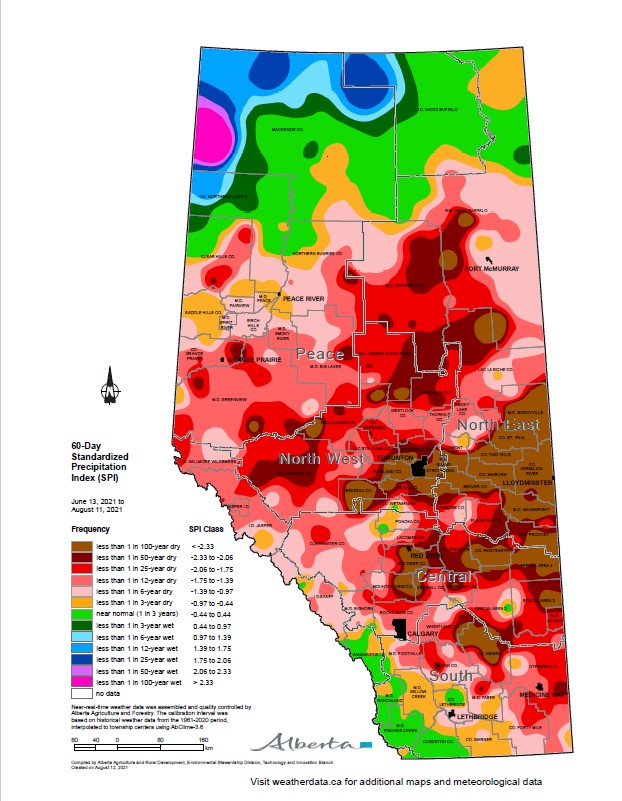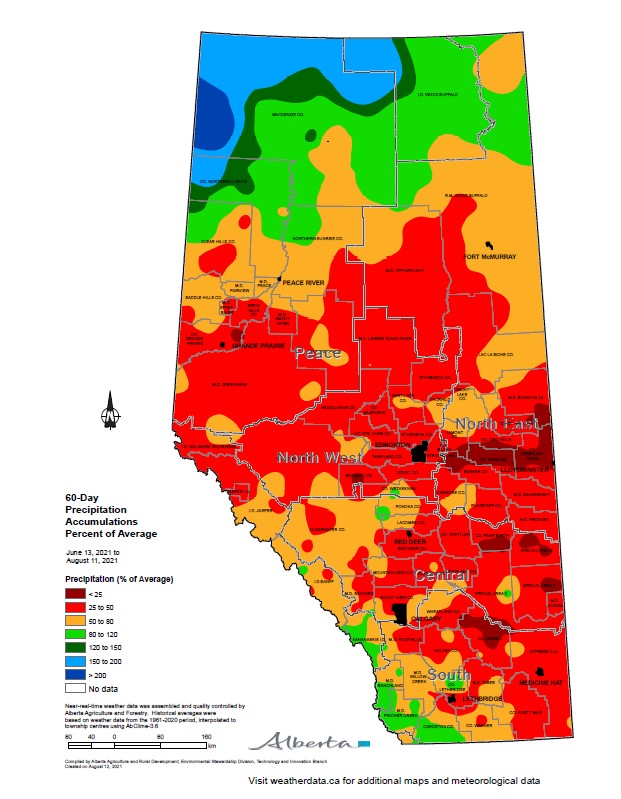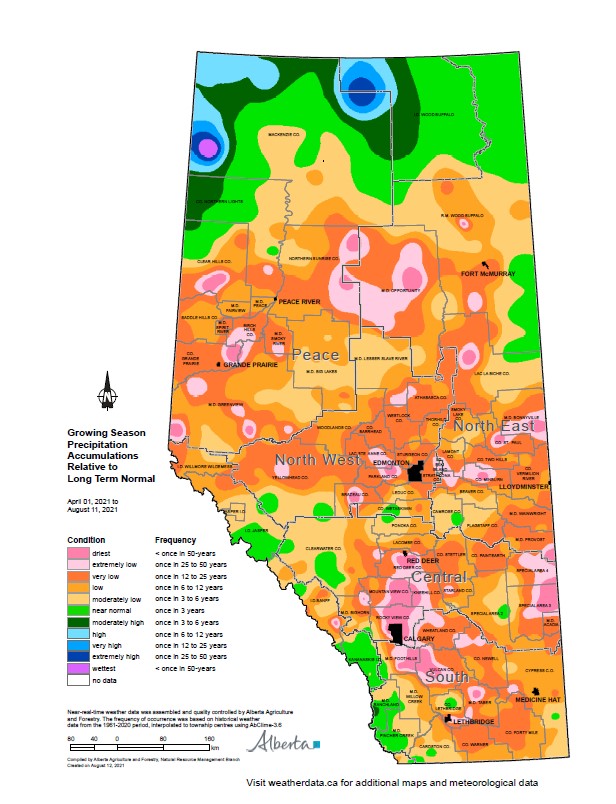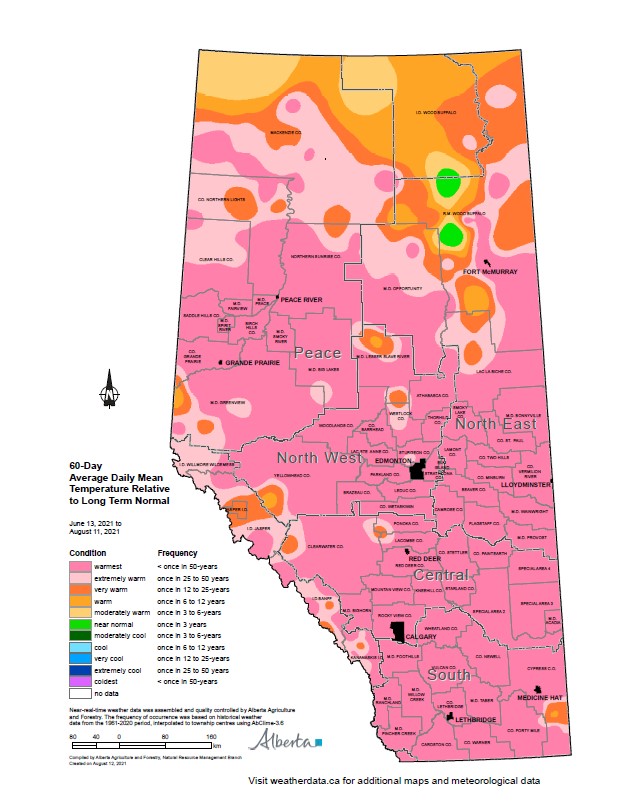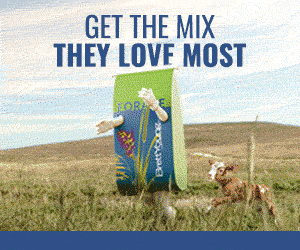AB Direct - Steers
Rail: 530.00-535.00 del
AB Direct - Heifers
Rail: 530.00-535.00 del
US Trade- Steers
Rail: 382.00-384.00 (NE, IA)
US Trade - Heifers
Rail: 382.00-384.00 (NE, IA)
Canadian Dollar
0.20

Drought-affected producers can start preparing for CALFA applications
Agriculture Financial Services Corporation (AFSC) is currently finalizing the details on the rollout of government support for drought-affected farms and ranches. The program is being called the 2021 Canada-Alberta Livestock Feed Assistance Initiative (CALFA). Producers can expect to apply in early September.
Background
On August 6, the Government of Alberta announced a commitment of $136 million for the province’s farmers and ranchers affected by drought. On Sunday, Aug 15, the Government of Canada announced an increase in total AgriRecovery funding for drought-affections provinces of up to $500 million, (including the $100 million announced in early August).
CCA thanks Government of Canada for up to $500 million AgriRecovery funding
Producers will soon be able to apply for interim payments under AgriStability, with the benefit payment percentage at 75 percent (up from 50 percent).
Prescribed drought regions for Livestock Tax Deferral were announced in late July. Producers in these regions may be eligible to defer income from livestock sales to next year’s tax year, when the income may be offset by the cost of buying breeding animals. Details and requirements: here.
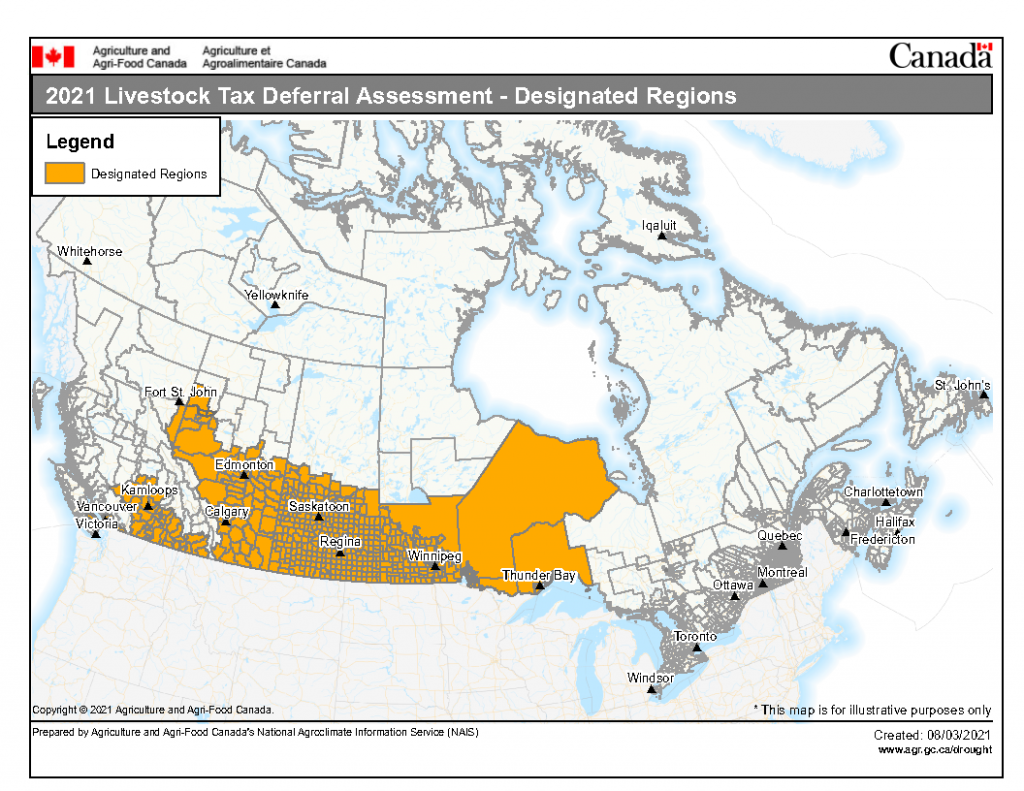
2021 Canada-Alberta Livestock Feed Assistance Initiative
The 2021 Canada-Alberta Livestock Feed Assistance Initiative (CALFA) will be offered in two stages.
- An initial payment of $94 per head for beef cows (conversions for other livestock can be found on AFSC website).
- Additional payments up to a maximum of $106 per head, pending federal funding.
How to prepare for CALFA
Agriculture Financial Services Corporation (AFSC) is finalizing CALFA details, and will share them as soon as possible.
In the meantime, producers should prepare for a smooth application process by:
- Ensuring you have an AFSC Connect account, and direct deposit.
(For those who aren’t currently AFSC clients, AFSC asks that you sign up for an AFSC Connect account, and stay tuned for directions to sign up for direct deposit to receive program payments.) - Preparing an inventory of breeding females on hand as of August 6, 2021.
- Keeping records of any expenses incurred for drought-related costs, including feeding livestock, up to December 31, 2021.
- Checking AFSC and ABP Daily for updates and following AFSC and Alberta Beef Producers on social media.
AFSC expects to have an application form available for producers in early September.
Other Assistance
Expanded grazing and hay opportunities
In addition to Alberta Agriculture and Forestry’s commitment to financial support through AFSC, Alberta Environment and Parks has expanded opportunities for grazing disposition holders, producers looking for hay/grazing on vacant Crown land, and permitting grazers in the forest reserve, where possible.
Farmers and ranchers interested in learning more about these programs are encouraged to call 310-FARM(3276).
Buying or selling feed
Producers are urged to use caution when buying feed, as several fraud cases have been reported.
Alberta Forage Industry Network (AFIN)’s Farming the Web offers a dedicated space for agriculture listings, including hay, feed, straw, and crop.
Current conditions
The Alberta Crop Report, as of August 10, showed variable precipitations throughout the province, with provincial crop condition ratings declining.
While Alberta’s five- and ten-year averages for crops in good to excellent condition were around 69 percent, last week’s report showed 18 percent. Pasture conditions were reported at 1 percent excellent, 16-17 percent good, 30-32 percent fair, and 51-52 percent poor.
Many producers won’t be seeing a second cut of hay this year, and the yield for first-cut was estimated at one ton per acre for dryland, and 2.1 tons per acre for irrigated hay.
Ag moisture update
Some areas of the province have received rain recently. According to the latest Agricultural Moisture Situation Update (August 12), some parts of the province received rainfalls of 10-15mm or more the week prior.
Despite the rainfall, areas of the province remain in drought, with it too late in the season to revive many annual crops.
Your Health
Farming and ranching can be hard at any time. If you notice signs that you are struggling, reach out to your primary caregiver, or call 2-1-1 (where available).
Need to talk? Here are some resources from across Canada
If you notice signs that a friend or family member is struggling, reach out to them.
Supporting each other – Moving beyond the “how are you?” reflex
Signs to watch for:
- Changes in appetite.
- Changes in sleeping patterns – having trouble falling or staying asleep, or sleeping far longer than usual.
- Increased substance use.
- Feelings of helplessness, hopelessness, or being trapped.
- Anxiety, agitation, uncontrolled anger, and/or dramatic mood changes.
- Withdrawal from friends, family, community.
- Acting recklessly or engaging in risky activities.
If you or someone you know is thinking about suicide, call Canada Suicide Prevention Service at 1-833-456-4566. If someone is in immediate danger, call 9-1-1.

